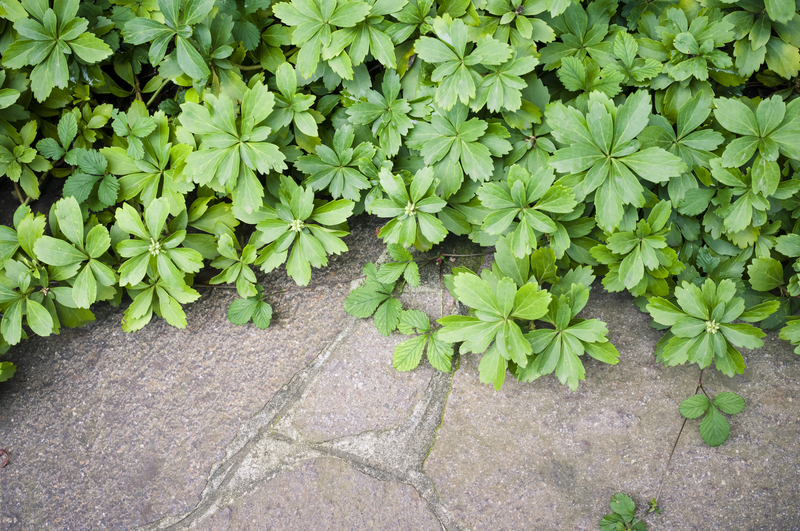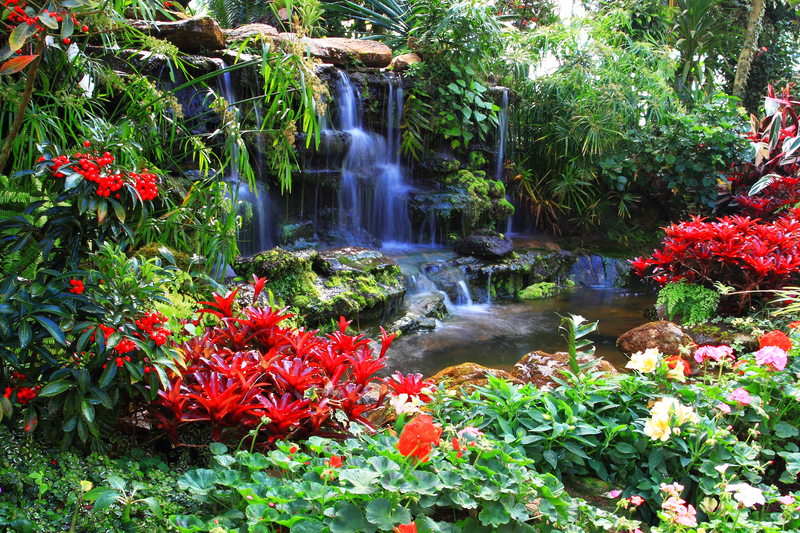Inspire Peace and Calm with a Beautiful Zen Garden Design
Posted on 19/09/2025
Inspire Peace and Calm with a Beautiful Zen Garden Design
If you crave serenity and balance in your outdoor or indoor environment, creating a Zen garden might be your ideal solution. With roots in Japanese culture, a Zen garden offers not just aesthetic pleasures but also a profound sense of tranquility and focus. Whether you're seeking to disconnect from everyday stress or simply add minimalist beauty to your space, discover how you can inspire peace and calm with a beautiful Zen garden design.

Understanding the Essence of Zen Gardens
Zen gardens, also known as Japanese rock gardens or karesansui, are carefully composed landscapes of rocks, moss, gravel, and minimal greenery. The design is deeply spiritual, reflecting principles of simplicity, mindfulness, and harmony with nature. Zen monks historically used these gardens for meditation and contemplation, making them the epitome of peaceful garden design.
Core Elements of a Zen Garden
- Rocks: Symbolize mountains, islands, or animals, serving as representations of permanence.
- Gravel or Sand: Raked into patterns to imitate the flow of water, bringing calmness and movement.
- Moss: Adds an organic, time-worn feel, representing thriving life in a peaceful environment.
- Minimal Plants: Select greenery such as small shrubs, bamboo, or ferns to enhance natural beauty without overcomplicating the scene.
- Water Features: Sometimes a gentle fountain or basin, echoing the presence of still or moving water.
Why Create a Zen Garden?
A well-crafted Zen garden offers a multitude of peaceful and calming benefits:
- Stress Reduction: The act of raking gravel or simply observing the garden's harmony can lower anxiety and promote deep relaxation.
- Mental Clarity: The uncluttered design encourages mindfulness and focus, helping you clear your mind and inspire meditative thought.
- Aesthetic Appeal: Zen garden design introduces beauty and minimalism to any setting, blending with traditional or modern decor.
- Connection to Nature: Employing natural elements fosters appreciation for simplicity and the natural world.
- Year-Round Enjoyment: Most Zen gardens, especially indoor or courtyard designs, provide enjoyment in every season with minimal upkeep.
Principles for a Beautiful Zen Garden Design
To inspire peace and calm with a beautiful Zen garden design, adhere to key principles refined over centuries in Japan:
1. Simplicity and Minimalism
Less is more. Avoid overcrowding your space with unnecessary plants or decor. Zen gardens rely on open spaces, modest use of color, and select natural materials.
2. Asymmetry
Rather than symmetry, Zen design celebrates irregularity. Place rocks, plants, and pathways in ways that mimic untouched nature, cultivating visual balance without repetition.
3. Symbolism
Each element carries meaning. For example, large rocks can signify mountains, while raked sand may symbolize rivers or the sea. Design with intention to foster deeper reflection.
4. Tranquil Harmony
Blend hard and soft textures, natural and crafted elements, sunlight and shadow. The space should invite you to pause, reflect, and find calm in the harmony of contrasts.
Steps to Design Your Own Zen Garden
Ready to cultivate peace at home or in your workplace? Follow this comprehensive guide to creating your inspiring Zen garden:
Step 1: Choose the Right Location
Select a quiet, undisturbed spot outdoors--a corner of your backyard, balcony, or even an indoor area with good natural light. Consider visibility from frequently used rooms to maximize enjoyment.
Step 2: Plan the Layout
- Sketch your design first, keeping in mind scale and proportion.
- Decide on a main focal point, such as a group of stones or a small tree.
- Leave ample empty spaces to reinforce simplicity.
Step 3: Select Materials
Materials for an authentic Zen-inspired garden include:
- Granite, basalt, or river stones of various shapes and sizes
- Fine gravel or clean white sand for raking patterns that inspire peace and calm
- Moss mats, if your climate allows
- Minimalist foliage such as dwarf bamboo, hostas, or Japanese maple
Step 4: Place Rocks Mindfully
Arrange rocks in odd-numbered groups (three, five, seven), ensuring some are partially buried for a natural, enduring appearance. Each stone should feel as though it has always belonged in its place.
Step 5: Add Sand or Gravel
- Spread a layer of sand or gravel around your stones and plants.
- Use a wooden rake to create rippling or linear patterns.
- Change the patterns regularly, using the raking process as a meditative practice.
Step 6: Integrate Minimal Greenery and Water
Add a few hardy shrubs, ferns, or moss patches for texture and color. For a tranquil effect, consider a small basin or fountain, remembering that Zen garden design thrives on simplicity.
Step 7: Finish with Subtle Accents
- Stone lanterns, bamboo fences, or a simple bench can enhance the mood without overwhelming your peaceful Zen space.
- Use natural, unobtrusive materials that blend with the landscape.
Indoor Zen Gardens: Tranquility for Any Space
An indoor Zen garden is perfect for apartments or homes with limited yard space. Even a tabletop Zen tray with sand, rocks, and a small rake can invite moments of mindfulness throughout your day.
- Choose a decorative tray or shallow dish as your base.
- Layer fine sand and arrange small rocks in pleasing, asymmetrical patterns.
- Add a petite bonsai or air plant for natural vibrancy.
- Rake the sand to form calming patterns and reset your mood whenever you desire.
Place your mini Zen garden on a coffee table, desk, or shelf--within easy reach so you can benefit from frequent contemplation and relaxation.
Maintaining Your Zen Garden's Peaceful Beauty
A stunning Zen garden design is surprisingly easy to maintain:
- Regular Raking: Refresh gravel or sand patterns to eliminate debris and reinforce mindfulness.
- Weed Management: Hand-pull weeds promptly and keep edges tidy for a crisp, clean appearance.
- Minimal Pruning: Trim plants as needed to retain desired shapes without introducing disorder.
- Stone Care: Wash occasionally to maintain their natural luster.
- Moss Cultivation: Mist with water during dry spells, keeping moisture consistent but not excessive.
The simplicity of the garden encourages regular yet unhurried care, itself a practice in mindfulness and presence.
Creative Zen Garden Ideas to Inspire Peace and Calm
Bringing your own personality into a traditional Zen design can make your space even more meaningful and calming. Here are a few inventive twists for your Zen garden design:
- Moon Viewing Platform: Add a flat stone seat or wooden deck to sit and reflect under the night sky.
- Sand Mandalas: Create intricate temporary patterns in the gravel for special occasions or meditative sessions.
- Pathways: Lay stepping stones through the garden, inviting a slow, contemplative walk.
- Sound Elements: Add a gentle chime or bamboo water spout (shishi-odoshi) for soothing auditory stimulation.
- Sculptural Accents: Place a subtle sculpture or inscribed stone with a favorite Zen proverb or calming symbol.
Best Plants for a Serene Japanese Zen Garden
While plants in a traditional Zen garden are minimal, choosing the right ones can enhance the sense of calm and beauty:
- Moss: Ideal for natural ground cover, thrives in moist, shaded zones.
- Bamboo: Adds vertical interest and the soothing sound of rustling leaves.
- Japanese Maple: Offers delicate foliage and seasonal color.
- Ferns: Provide lushness and unify shaded corners.
- Hosta: Hardy, low-maintenance leaves for texture and depth.
- Boxwood: Perfect for clipped geometric shapes in urban Zen gardens.

Finding Your Own Zen in Design and Practice
What truly makes a Zen-inspired garden special is not just its visual appeal, but the sense of calm and inner peace it inspires. Every aspect of the garden--from placement of rocks to raking sand--is an invitation to slow down, center your mind, and appreciate the beauty in stillness.
*Spending just a few minutes daily in your Zen garden* can recharge your mood, boost creativity, and promote lasting tranquility in your surroundings.
Conclusion: Embrace Tranquility with a Beautiful Zen Garden Design
A thoughtfully planned Zen garden is more than just an aesthetic feature--it's a sanctuary that invites stillness, reflection, and order into your life. Inspire peace and calm with a beautiful Zen garden design that honors nature and tradition while reflecting your unique vision of tranquility. Whether you're working with a grand outdoor space or a compact tabletop, your Zen retreat awaits!
Ready to transform your space and soothe your spirit? Let your journey to Zen begin today, and discover how elegant simplicity can create a world of calm right at home.
Latest Posts
Cost-Effective Tips for a Low Maintenance Garden Delight
Inspire Peace and Calm with a Beautiful Zen Garden Design
Bringing Greenery Indoors with Container Gardening

